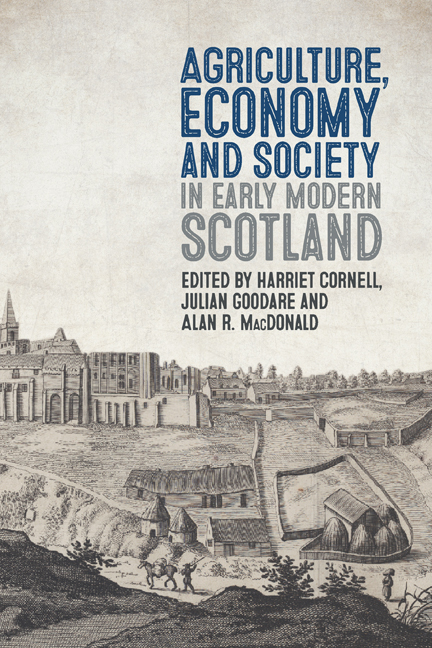Book contents
- Frontmatter
- Dedication
- Contents
- Illustrations
- Contributors
- Acknowledgements
- Note on Currency and Measures
- Abbreviations
- Map of Scotland
- Introduction: Exploring Scotland’s Agricultural History
- 1 Imagining Scottish Agriculture before the Improvers
- 2 The Use of Dykes in Scottish Farming 1500–1700
- 3 The Famine of 1622–23 in Scotland
- 4 Weather and Farming through the Eyes of a Sixteenth-Century Highland Peasant
- 5 Stock, Fermes, Mails and Duties in a Midlothian Barony 1587–89
- 6 The Roots of Improvement: Early Seventeenth-Century Agriculture on the Mains of Dundas, Linlithgowshire
- 7 ‘God Knowis my Sleipis ar Short and Unsound’: Andro Smyth’s Collection of Rent, Tax, Teind and Tolls in Shetland c.1640
- 8 Farming in the Stirling Area 1560–1750
- 9 What Were the Fiars Prices Used For?
- 10 Agriculture and Banking in Eighteenth-Century Scotland 1695–1750
- 11 Capitalism’s Cradle? Ideas, Policies and the Rise of the Scottish Economy in the Mercantilist Age 1600–1800
- Conclusion: A Historiographical and Bibliographical Overview
- Index
- Boydell Studies in Rural History
11 - Capitalism’s Cradle? Ideas, Policies and the Rise of the Scottish Economy in the Mercantilist Age 1600–1800
Published online by Cambridge University Press: 14 May 2024
- Frontmatter
- Dedication
- Contents
- Illustrations
- Contributors
- Acknowledgements
- Note on Currency and Measures
- Abbreviations
- Map of Scotland
- Introduction: Exploring Scotland’s Agricultural History
- 1 Imagining Scottish Agriculture before the Improvers
- 2 The Use of Dykes in Scottish Farming 1500–1700
- 3 The Famine of 1622–23 in Scotland
- 4 Weather and Farming through the Eyes of a Sixteenth-Century Highland Peasant
- 5 Stock, Fermes, Mails and Duties in a Midlothian Barony 1587–89
- 6 The Roots of Improvement: Early Seventeenth-Century Agriculture on the Mains of Dundas, Linlithgowshire
- 7 ‘God Knowis my Sleipis ar Short and Unsound’: Andro Smyth’s Collection of Rent, Tax, Teind and Tolls in Shetland c.1640
- 8 Farming in the Stirling Area 1560–1750
- 9 What Were the Fiars Prices Used For?
- 10 Agriculture and Banking in Eighteenth-Century Scotland 1695–1750
- 11 Capitalism’s Cradle? Ideas, Policies and the Rise of the Scottish Economy in the Mercantilist Age 1600–1800
- Conclusion: A Historiographical and Bibliographical Overview
- Index
- Boydell Studies in Rural History
Summary
Nowhere else in the world did the birth of capitalism come about in so curious a fashion as in Scotland. Nothing is more surprising than the suddenness of its appearance. It is as though a pistol shot had given the signal for the capitalist spirit, fully grown, to come into the land and dominate it. You cannot help thinking of the Victoria Regia, which blooms overnight.
Thus noted Werner Sombart, one of Germany's most influential thinkers on capitalism at the time (alongside Max Weber), in his study on Der Bourgeois in 1913. Sombart's emphasis on Scotland seems striking only inasmuch as recent global histories of capitalism, industrialisation and modern economic growth have usually been written from a perspective focusing on either England (or certain regions within England) or the Netherlands as norm template proxies for ‘Western Europe’, when studying the so-called ‘Great Divergence’ and processes of global economic modernisation. The small northern presbyterian nation is
usually left out of the picture, including studies taking an expressly ‘British’ perspective. Just consider pars pro toto the signature and flagship project ‘Cambridge Economic History of Modern Britain’: even though the second edition (2004) did feature a chapter on Scotland written by Devine, the editors of the third edition (2018) decided to leave that chapter out again; the first edition had contained no such chapter, either, conceived in the usual imperial or Anglocentric epistemic perspective. Most accounts of British economic growth in historical perspective to the present day either omit or – even worse – extrapolate Scotland after 1707, often inferring Scottish gross domestic product (GDP) growth rates by using (constant) population ratios. To the present day we lack estimates for Scottish GDP after 1707 of the sort that have been produced for England since the eleventh century using various (and changing) econometric techniques.
This is a more than sad – albeit still common – omission. Sombart, dismissing Catholic Ireland (‘Down to this very day there is scarcely another land which has been so little affected by the capitalist spirit’), thought that Scotland had even influenced England in the development of capitalism: ‘the course of capitalist development in England was greatly influenced by the fortunes of the capitalist spirit in the Northern Kingdom’.
- Type
- Chapter
- Information
- Agriculture, Economy and Society in Early Modern Scotland , pp. 235 - 262Publisher: Boydell & BrewerPrint publication year: 2024



